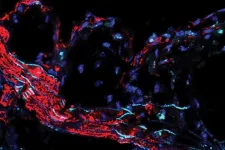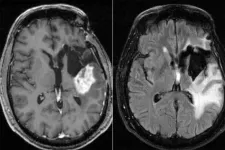Scientists find genetic link to clogged arteries
Independent of cholesterol, gene variants raise risk of heart disease, diabetes, high blood pressure
2021-03-31
(Press-News.org) High cholesterol is the most commonly understood cause of atherosclerosis, a hardening of the arteries that raises the risk of heart attack and stroke. But now, scientists at Washington University School of Medicine in St. Louis have identified a gene that likely plays a causal role in coronary artery disease independent of cholesterol levels. The gene also likely has roles in related cardiovascular diseases, including high blood pressure and diabetes.
The study appears March 24 in the journal Science Translational Medicine.
Studying mice and genetic data from people, the researchers found that the gene -- called SVEP1 -- makes a protein that drives the development of plaque in the arteries. In mice, animals missing one copy of SVEP1 had less plaque in the arteries than mice with both copies. The researchers also selectively reduced the protein in the arterial walls of mice, and this further reduced the risk of atherosclerosis.
Evaluating human genetic data, the researchers found that genetic variation influencing the levels of this protein in the body correlated with the risk of developing plaque in the arteries. Genetically determined high levels of the protein meant higher risk of plaque development and vice versa. Similarly, they found higher levels of the protein correlated with higher risk of diabetes and higher blood pressure readings.
"Cardiovascular disease remains the most common cause of death worldwide," said cardiologist Nathan O. Stitziel, MD, PhD, an associate professor of medicine and of genetics. "A major goal of treatment for cardiovascular disease has appropriately been focused on lowering cholesterol levels. But there must be causes of cardiovascular disease that are not related to cholesterol -- or lipids -- in the blood. We can decrease cholesterol to very low levels, and some people still harbor residual risk of future coronary artery disease events. We're trying to understand what else is going on, so we can improve that as well."
This is not the first nonlipid gene identified that has been implicated in cardiovascular disease. But the exciting aspect of this discovery is that it lends itself better to developing future therapies, according to the investigators.
The researchers -- including co-first authors In-Hyuk Jung, PhD, a staff scientist, and Jared S. Elenbaas, a doctoral student in Stitziel's lab -- further showed that this protein is a complex structural molecule and is manufactured by vascular smooth muscle cells, which are cells in the walls of blood vessels that contract and relax the vasculature. The protein was shown to drive inflammation in the plaques in the artery walls and to make the plaques less stable. Unstable plaque is particularly dangerous because it can break loose, leading to the formation of a blood clot, which can cause heart attack or stroke.
"In animal models, we found that the protein induced atherosclerosis and promoted unstable plaque," Jung said. "We also saw that it increased the number of inflammatory immune cells in the plaque and decreased collagen, which serves a stabilizing function in plaques."
According to Stitziel, other genes previously identified as raising the risk of cardiovascular disease independent of cholesterol appear to have widespread roles in the body and are therefore more likely to have far-reaching undesirable side effects if blocked in an effort to prevent cardiovascular disease. Although SVEP1 is required for early development of the embryo, eliminating the protein in adult mice did not appear to be detrimental, according to the researchers.
"The human genetic data showed a naturally occurring wide range of this protein in the general population, suggesting that we might be able to alter its levels in a safe way and potentially decrease coronary artery disease," Elenbaas said.
Ongoing work in Stitziel's group is focused on seeking ways to block the protein or reduce its levels in an effort to identify new compounds or possible treatments for coronary artery disease and, perhaps, high blood pressure and diabetes. The researchers have worked with Washington University's Office of Technology Management (OTM) to file a patent for therapies that target the SVEP1 protein.
INFORMATION:
This work was supported in part by grants from the National Institutes of Health (NIH), grant numbers T32GM007200, T32HL134635, T32HL007081, R01HL53325, R01HL131961, UM1HG008853 and UL1TR002345; a career award from the National Lipid Association; and by The Foundation for Barnes-Jewish Hospital.
Jung I, Elenbaas JS, et al. SVEP1 is a human coronary artery disease locus that promotes atherosclerosis. Science Translational Medicine. March 24, 2021.
Washington University School of Medicine's 1,500 faculty physicians also are the medical staff of Barnes-Jewish and St. Louis Children's hospitals. The School of Medicine is a leader in medical research, teaching and patient care, ranking among the top 10 medical schools in the nation by U.S. News & World Report. Through its affiliations with Barnes-Jewish and St. Louis Children's hospitals, the School of Medicine is linked to BJC HealthCare.
[Attachments] See images for this press release:

ELSE PRESS RELEASES FROM THIS DATE:
2021-03-31
LA JOLLA--(March 31, 2021) Clinicians using a new viral screening test can not only diagnose COVID-19 in a matter of minutes with a portable, pocket-sized machine, but can also simultaneously test for other viruses--like influenza--that might be mistaken for the coronavirus. At the same time, they can sequence the virus, providing valuable information on the spread of COVID-19 mutations and variants. The new test, dubbed NIRVANA, was described online today by a multi-institution team of scientists in the journal Med.
"This is a virus detection and surveillance method that doesn't require an expensive infrastructure like other approaches," says Juan Carlos Izpisua Belmonte, co-corresponding author and a professor in Salk's Gene Expression ...
2021-03-31
AURORA, Colo. (March 31, 2021) - A new study published in Frontiers in Psychiatry finds that patients with Obsessive Compulsive Disorder (OCD) as well as other psychiatric comorbidities, such as autism spectrum or tic disorders, may respond well to Deep Brain Stimulation (DBS).
DBS is a minimally invasive neurosurgical procedure that uses coordinates to target certain areas of the brain, implanting electrodes that can help regulate abnormal brain activity. DBS procedures are rare for OCD in the United States; only a couple hundred patients have received this treatment for OCD management since its FDA approval ...
2021-03-31
An aggressive type of brain cancer, glioblastoma has no cure. Patients survive an average of 15 months after diagnosis, with fewer than 10% of patients surviving longer than five years. While researchers are investigating potential new therapies via ongoing clinical trials, a new study from Washington University in St. Louis suggests that a minor adjustment to the current standard treatment -- giving chemotherapy in the morning rather than the evening -- could add a few months to patients' survival.
The study appears online in the journal Neuro-Oncology Advances.
Average overall survival ...
2021-03-31
AURORA, Colo. (March 30, 2021 - Researchers at the University of Colorado College of Nursing have found that nearly one-quarter of graduate nursing students have reported elevated levels of stress, anxiety and depression, compounded in the past year by the COVID-19 pandemic.
Study findings, published recently in END ...
2021-03-31
A new invention that uses sunlight to drive water purification could help solve the problem of providing clean water off the grid.
The device resembles a large sponge that soaks up water but leaves contaminants - like lead, oil and pathogens - behind. To collect the purified water from the sponge, one simply places it in sunlight. The researchers described the device in a paper published this week in the journal Advanced Materials.
The inspiration for the device came from the pufferfish, a species that takes in water to swell its body when threatened, and then releases water when danger passes, said the device's co-inventor END ...
2021-03-31
When it comes to powering mobile robots, batteries present a problematic paradox: the more energy they contain, the more they weigh, and thus the more energy the robot needs to move. Energy harvesters, like solar panels, might work for some applications, but they don't deliver power quickly or consistently enough for sustained travel.
James Pikul, assistant professor in Penn Engineering's Department of Mechanical Engineering and Applied Mechanics, is developing robot-powering technology that has the best of both worlds. His environmentally controlled voltage source, or ECVS, works like a battery, in that the energy is produced by repeatedly breaking ...
2021-03-31
In looking at the broader impact of the COVID-19 pandemic on health and wellbeing, public health experts are examining screening rates for cancer. A new study looking at U.S. mammography screening rates during the first five months of the pandemic found both a strong rebound in breast cancer screening rates and a concerning cumulative deficit in mammograms due to missed appointments, as well as uncovering disparities when looking at screening according to race.
The study was released this week in the Journal of the National Cancer Institute.
Conducted by investigators from the Breast Cancer Surveillance Coalition (BCSC), a federally-funded, national network of breast imaging registries, the study sought to quantify the impact of the COVID-19 ...
2021-03-31
Denver, CO, March 31, 2020 - Children with Down syndrome are 20-times more likely to develop acute lymphocytic leukemia (ALL) and 150-times more likely to develop acute myeloid leukemia (AML) compared to their typical peers. According to a new study by researchers at the Linda Crnic Institute for Down Syndrome, the reason could be that children with Down syndrome are more likely to present with clonal hematopoiesis (CH), a process in which a blood stem cell acquires a genetic mutation that promotes replication.
The findings, published online by Blood Advances, add to a growing body of evidence, much of which has been established ...
2021-03-31
Washington, DC-- Diamonds that formed deep in the Earth's mantle contain evidence of chemical reactions that occurred on the seafloor. Probing these gems can help geoscientists understand how material is exchanged between the planet's surface and its depths.
New work published in Science Advances confirms that serpentinite--a rock that forms from peridotite, the main rock type in Earth's mantle, when water penetrates cracks in the ocean floor--can carry surface water as far as 700 kilometers deep by plate tectonic processes.
"Nearly all tectonic plates that make up the seafloor eventually bend and slide down into ...
2021-03-31
PITTSBURGH --31 March 2021 - A detailed examination of more than 10,000 medical records at maternity clinics and hospitals in urban Malawi, South Africa, Uganda and Zimbabwe has yielded important insight about pregnancy and neonatal outcomes in these communities as well as the frequency with which different complications occur. The findings, which were published in PLOS ONE, include data not often available or reported in much of eastern and southern Africa.
The medical chart review was undertaken by researchers from the National Institutes of Health-funded Microbicide Trials Network ...
LAST 30 PRESS RELEASES:
[Press-News.org] Scientists find genetic link to clogged arteries
Independent of cholesterol, gene variants raise risk of heart disease, diabetes, high blood pressure





